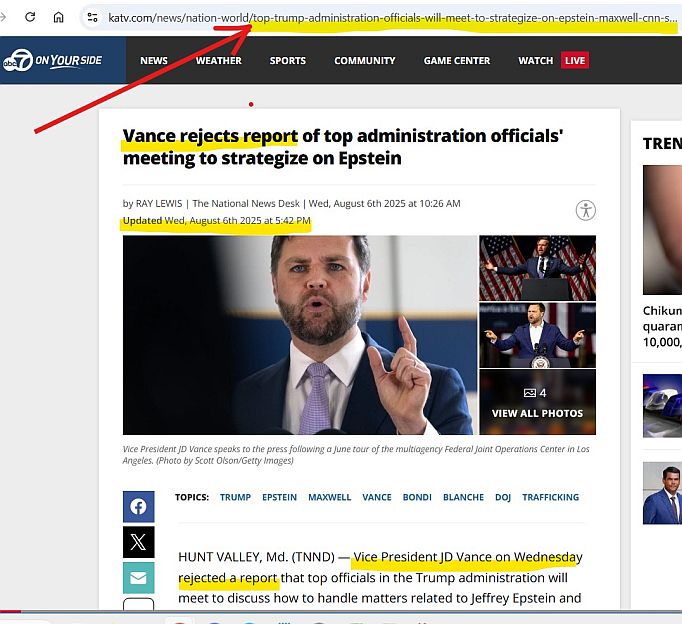Tick-Tock: Redirecting Attention from Epstein Coverup Conspiracy
[NB: check the byline, thanks. /~Rayne]
I’m going to let this collection of snapshots speak for themselves. Links to these stories will be furnished at the bottom of the post; some publication times are overseas and may not be the first publication time but an unspecified update time.
I know, I know — I screwed up and should have parked the two August 6 10:48 AM ET stories side by side. You get the drift; those two and the story between them are listed in Google News as published 19 hours ago from approximately 9:00 AM ET when I started pulling these together.
How conveniently the story about Vance’s canoe trip popped up just about the time the Epstein conspiracy meeting was making too much trouble for Trump and his conspirators, just about the time Team Trump was desperate enough to think about compromising one of their Epstein skeptics to change the direction of media and public attention.
UPDATE — 10:40 AM —
I want to point out KATV changed the headline as well as the lede of their story. The image above shows the original headline which is still evident in the story’s URL. The update changes the impetus of the story completely.
What I can’t tell is how long it takes for Google News to swap the original headline for the “updated” version of a story. Clearly it didn’t happen between 5:42 PM ET when the story was “updated” by The National News Desk and refreshed at KATV, and roughly 9:00 AM ET this morning when I took a screen capture from Google News.
What’s interesting is the “updated” story angle — Vance’s denial about the Epstein files meeting — emerged almost in tandem with the Ohio River story.
This may not be the only “updated” story out there.
___________________
Top Trump officials will discuss Epstein strategy at Wednesday dinner hosted by Vance
Updated Aug 6, 2025, 3:46 PM ET
PUBLISHED Aug 5, 2025, 10:04 AM ET
By Alayna Treene, Josh Campbell, Paula Reid, Kristen Holmes, Kaitlan Collins
https://www.cnn.com/2025/08/05/politics/trump-blanche-epstein-maxwell-vance-bondi-patel-meeting
Trump Officials to Discuss Handling of Jeffrey Epstein Case: Report
Published Aug 05, 2025 at 11:07 PM EDT
By Anna Commander
https://www.newsweek.com/trump-officials-discuss-handling-jeffrey-epstein-case-report-2109432
Top Trump administration officials will meet to strategize on Epstein, Maxwell, CNN says [1]
Wed, August 6th 2025 at 10:26 AM Updated Wed, August 6th 2025 at 5:42 PM
By RAY LEWIS | The National News Desk
https://katv.com/news/nation-world/top-trump-administration-officials-will-meet-to-strategize-on-epstein-maxwell-cnn-says
Vance, Bondi, Patel to huddle at VP residence for meeting amid Epstein fallout [2]
By Breanne Deppisch, David Spunt, Jake Gibson
Published August 6, 2025 10:48am EDT | Updated August 6, 2025 2:07pm EDT
https://www.foxnews.com/politics/vance-bondi-patel-huddle-vp-residence-epstein-strategy-meeting
Vance expected to host Epstein strategy dinner with Bondi, Blanche, Patel
August 6, 2025, 3:32 PM
By Katherine Faulders
https://abcnews.go.com/Politics/vance-expected-host-epstein-strategy-dinner-bondi-blanche/story?id=124407326
Vance To Hold Epstein Strategy Meeting With Top FBI, DOJ Officials
August 06, 2025 10:48 AM ET
By Reagan Reese
https://dailycaller.com/2025/08/06/jd-vance-fbi-doj-strategy-meeting-epstein-fallout-ghislaine-maxwell/
JD Vance’s Epstein strategy dinner with Kash Patel today: ‘Missing from this group is….’
TOI World Desk / TIMESOFINDIA.COM / Updated: Aug 06, 2025, 22:24 IST
https://timesofindia.indiatimes.com/world/us/jd-vances-epstein-strategy-dinner-with-kash-patel-today-missing-from-this-group-is-/articleshow/123145846.cms
JD Vance to host Epstein strategy dinner with top Trump officials, including AG Bondi, FBI boss Kash Patel
Published Aug. 6, 2025, 12:47 p.m. ET
By Breanne Deppisch, David Spunt, Jake Gibson
https://nypost.com/2025/08/06/us-news/vance-to-host-epstein-strategy-dinner-with-bondi-patel-blanche/
JD Vance to meet with top Trump officials to plot Epstein strategy – report
Wed 6 Aug 2025 13.20 EDT
By Anna Betts-New York
https://www.theguardian.com/us-news/2025/aug/06/jeffrey-epstein-jd-vance-trump-meeting
JD Vance denies convening Trump’s top team to discuss Epstein
Wednesday August 06 2025, 7.25 pm BST, The Times
By Lara Spirit-Washington DC
https://www.thetimes.com/us/american-politics/article/epstein-strategy-dinner-jd-vance-maxwell-xrmvz7qjt
JD Vance’s team had water level of Ohio river raised for family’s boating trip
Wed 6 Aug 2025 17.46 EDT
By Stephanie Kirchgaessner and David Smith
https://www.theguardian.com/us-news/2025/aug/06/jd-vance-ohio-lake-water-levels
Trump Makes JD Vance Awkwardly Deny Secret Epstein Crisis Talks
Updated Aug. 6 2025 8:31PM EDT
Published Aug. 6 2025 8:02PM EDT
By Farrah Tomazin
https://www.thedailybeast.com/trump-makes-jd-vance-awkwardly-deny-secret-epstein-crisis-talks/
Planned dinner for Trump officials to discuss Epstein appears to have been moved amid media scrutiny
Updated Aug 6, 2025, 9:38 PM ET
PUBLISHED Aug 6, 2025, 3:55 PM ET
By By Kristen Holmes, Alayna Treene
https://www.cnn.com/2025/08/06/politics/jd-vance-dinner-epstein-scandal
Trump team looking to Joe Rogan for help amid lingering Epstein-Ghislaine Maxwell fallout, report says
Thursday 07 August 2025 14:41 BST
By Oliver O’Connell
https://www.independent.co.uk/news/world/americas/us-politics/trump-epstein-joe-rogan-vance-maxwell-dinner-news-live-b2803187.html
[1] See update at bottom of post above
[2] Headline from embedded video appears in Google News; article headline is different
___________________
*** NEED FROM YOU *** Any story about the Epstein files should be archived because they are subject to change. At least two of the stories above may have been manipulated so that the original headline doesn’t now appear in Google News.
To archive in the Wayback Machine at the Internet Archive:
• Copy the URL of the news story.
• Go to https://web.archive.org/
• Paste the URL into the Save Page Now field at the lower right of the site and click on Save Page button
• When next page opens, click on Save Page, check the box to include error messages (this will tell readers when the page may have gone bad/been pulled)
Don’t let them try to sweep coverage under the digital rug!
###
 \
\
